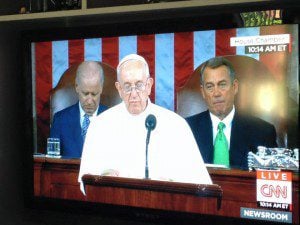In order to understand the relationship between Christian spirituality and engagement with the needs of the world, one must begin by recognizing that for most of 1500 years, the two were part of the whole.
The journey inward led to a journey outward, or to put it another way, one’s relationship with God and one’s relationship with others are inextricably linked to one another. In both the Old Testament and the New Testament this principle is a constant.
The Old Testament
In the Old Testament, this vision of spirituality is rooted in the picture that the Book of Genesis offers of the human dilemma:
The desire to be our own gods
not only alienates us from God,
it alienates us from one another
and from the world around us.
That is the deep truth of Genesis 3 and one need not read its story literally or flat-footedly. One need not even read it as a story about original sin. It is, quite simply, the truth about all of us.
The remedy – the spirituality of the Old Testament, if you will – lies in the redemptive work of God.
The God who forges a covenant with Israel and outlines the character of that relationship in Torah, which means meaning “instruction.” Tellingly, that covenant speaks directly to the human dilemma, both collective and individual, describing both the healing of Israel’s relationship with her God and a healing of relationships among those who are part of the covenantal community. The first four commandments reveal the nature of Israel’s relationship with God. The fifth commandment enjoins cessation-dependence-observance of the Sabbath. The next five commandments reveal the nature of human relationships within Israel. (Exodus 20:1-17; Deuteronomy 5:4-21)
This priority is not confined to the Pentateuch. The Psalms, wisdom writers and the prophets remind Israel of this priority. They emphasize justice (mishpat) and righteousness (tzedakah) and the characteristics that are implied in both. Mishpat carries with it connotations of balance, harmony and equilibrium. Tzedekah carries with it connotations of benevolence, kindness and generosity.
But, the same body of literature also continues to insist on the indispensable nature of worship, even though it is critical of worship that is unaccompanied by justice and righteousness. (e.g., Psalm 132:7-9, 13-14; Isaiah 1:12)
This insistence on worship is based upon a second principle that both Testaments assume:
Justice and righteousness (like all other virtues) are characteristics of God.
They do not exist apart from God.
They cannot be understood apart from God.
They cannot be attained without knowing God. (e.g., Proverbs 14:31, 15:5; Isaiah 30.18)
The New Testament
Both principles remain the basis of the teaching of Jesus, whether one thinks of the signs and wonders that Jesus performs or one thinks of the Sermon on the Mount. Jesus makes it clear that the coming of the Kingdom signals the healing of relationships with God and with others, and he also indicates that our relationships with God and others are inextricably tied to one another.
Jesus also assumes, as does the Old Testament, that one can only know how to live by knowing God. This is implicit in the authority with which he teaches (Mark 1:22), and it is also expressly a part of his teaching (Matthew 5:48).
The same assumptions are carried forward in the New Testament and applied to the church – both in the Gospels, which assume that the teaching of Jesus applies to the church. They appear in Paul, who compulsively teaches that the facts of the faith have implications for our conduct and who argues that the demands of that faith can only be understood by having the mind of Christ (Romans 12:1). They are implicit in Paul’s description of Christians as those who are “in Christ.” They appear in the Gospel of John where dwelling in God is the experience out of which the life of God emerges (John 17).
Christian vs. Civic understandings of justice
All of this argues for a spirituality that sees engagement with the needs of others as a seamless part of the same experience. However, there are important distinctives to register, that are often lost in contemporary conversations about the church and engagement with the needs of others:
One, Israel, the first followers of Jesus, and then, the church are the focal point of the outworking of justice and righteousness.
Neither the empires of the Ancient Near East, nor the Roman Empire were the focus of the Old Testament or the New.
Two, by inference, then, the focus of efforts that work for justice and righteousness are not the nations-states in which the church finds itself located.
It is the church itself where justice and righteousness is meant to be pursued and realized; and is the justice and righteousness of God to which the church witnesses.
Three, the church also holds that it is only in the experience of God in Christ that one can thoroughly know what justice and righteousness demand of us.
Therefore, those outside the church will never fully understand what shapes the Christian’s understanding of those goals, and Christians will always live in tension with the world around them, even when they seemingly share similar goals.
They will not share the vocabulary of others. They will risk being misunderstood. More importantly, because justice and righteousness are only understood as we journey into God, no civic effort toward achieving justice and righteousness will ever be adequate from a Christian point of view.
A Christian Spirituality of Justice
In democratic nations, the effort to realize righteousness and justice will remain an obligation.
But Christians cannot afford to conflate work done in the larger social settings of which we are a part with the realization of justice and righteousness in the church. Nor can we be satisfied with a church that does not strive to be the place where the fullness of the Kingdom is pursued.
To know God is to know what is required of us. It is to know – in all its fullness – the demands of righteousness and justice, forgiveness and mercy, love and grace, truth and wisdom. That knowledge cannot be summarized in systems or slogans, parties or platforms, methods or metrics. It arises out of an experience of God that invites us into a life which cannot be distilled into policies or exhausted in legislation. And when we are satisfied with less than this experience, we fail him. To be invited into the life of God in Christ is to be invited into a life which shatters our feeble understandings of love and mercy, righteousness and justice. No economic policy, no political agenda, no legislation can free us of the demand that life makes upon us.
No other way of doing that work can renew us. The only spirituality that can sustain us in the effort is one rooted in a journey into God, where we are reminded that the healing of the world is God’s work.
However, it is that demand that also sustains us. Many people talk today about burnout. When the pursuit of justice is a program, that lacks roots in the Christian journey, that complaint is predictable. Breathing techniques and other spiritual practices alone will not help. It is the journey into God that sustains our efforts.
Photo by Motoki Tonn on Unsplash













